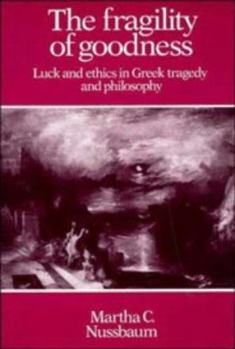The Fragility of Goodness: Luck and Ethics in Greek Tragedy and Philosophy
Select Format
Select Condition 
Book Overview
This book is a study of ancient views about moral luck. It examines the fundamental ethical problem that many of the valued constituents of a well-lived life are vulnerable to factors outside a... This description may be from another edition of this product.
Format:Paperback
Language:English
ISBN:0521277027
ISBN13:9780521277020
Release Date:March 1986
Publisher:Cambridge University Press
Length:576 Pages
Weight:1.70 lbs.
Dimensions:1.1" x 6.0" x 9.0"
Related Subjects
Drama Ethics Ethics & Morality History History & Surveys Philosophy Politics & Social Sciences Tragedy WorldCustomer Reviews
4 ratings
Interesting exploration of contingency in human happiness
Published by Thriftbooks.com User , 16 years ago
I am not a classics scholar, so I am not fit to judge the opinions of others stated here that Nussbaum 'misreads' the works of ancient philosophers. Nevertheless, in my reading of Nussbaum's works I do not see any evidence to suggest Nussbaum is being careless in her exegesis and interpretation of the works of ancient philosophy. Her thesis is quite interesting and intricate, and based around the examination of attempts by Greek thinkers, especially Plato and Aristotle, to overcome the fragility and contingency of our human condition. The bias of Nussbaum is clearly towards Aristotle's down-to Earth philosophy over Plato's attempts to totally transcend our weakness by placing happiness in contemplation of the Forms, though she does not dismiss Plato out of hand. While one may not ultimately accept her arguments or her thesis, her ideas are carefully argued and supported by close readings of the ancient philosophers, and well worth considering.
What were they reading?
Published by Thriftbooks.com User , 23 years ago
In this book, Ms. Nussbaum takes on one of the most challenging and heart-rending questions raised by the ancient poets and philosophers: what is the relationship between goodness (good character, right action) and having a good life (happiness, human flourishing)?With the tragedians, and against some of the philosophers (notably Plato), Ms. Nussbaum considers the possibility that right action and right thinking cannot protect us from the pain of life's contingencies, and (much worse) that sheer bad luck can blight character itself.Ms. Nussbaum addresses the issues and the texts with respect for their subtlety, with imaginative insight, and with her characteristic regard for reason. Every time she discusses a text, I come away knowing more about that text--and more about life. "Comforting platitudes" and "sloppy" exegesis? No. Not hardly.
A different read
Published by Thriftbooks.com User , 23 years ago
There are two ways one might approach the Fragility of Goodness. One might approach the text in search of careful exegesis of classical texts. If this is one's aim, one will probably be disappointed with what Nussbaum provides in this book. On the other hand, one might approach the text in search of a thought-provoking discussion of important issues in moral and political philosophy. If the latter is one's concern, then Nussbaum's work is rich, exciting and well worth reading.
Brilliant, searching, essential.
Published by Thriftbooks.com User , 25 years ago
Anyone interested in Greek philosophy and literature should read this wonderful book. Nussbaum is the only scholar-philosopher working today with an understanding of the complex and challenging ideas of these texts as well as their literary forms and historical contexts. This book, along with Bruno Snell's "The Discovery of the Mind," is required reading for any student of Plato, Aristotle, and the Greek tragedians (whether they're in a formal academic institution or not).




